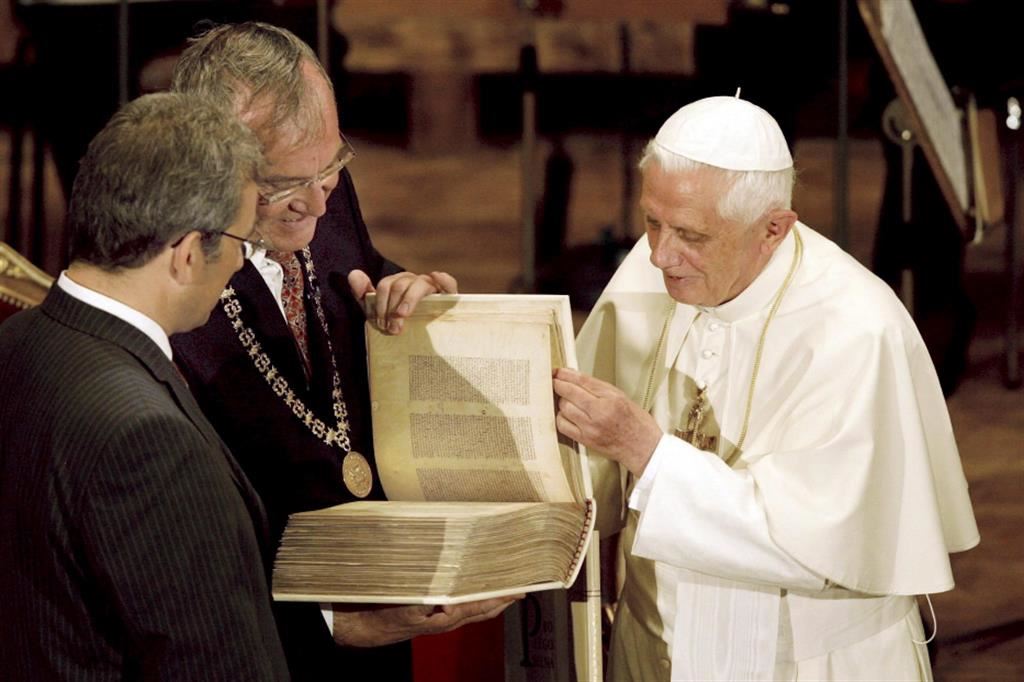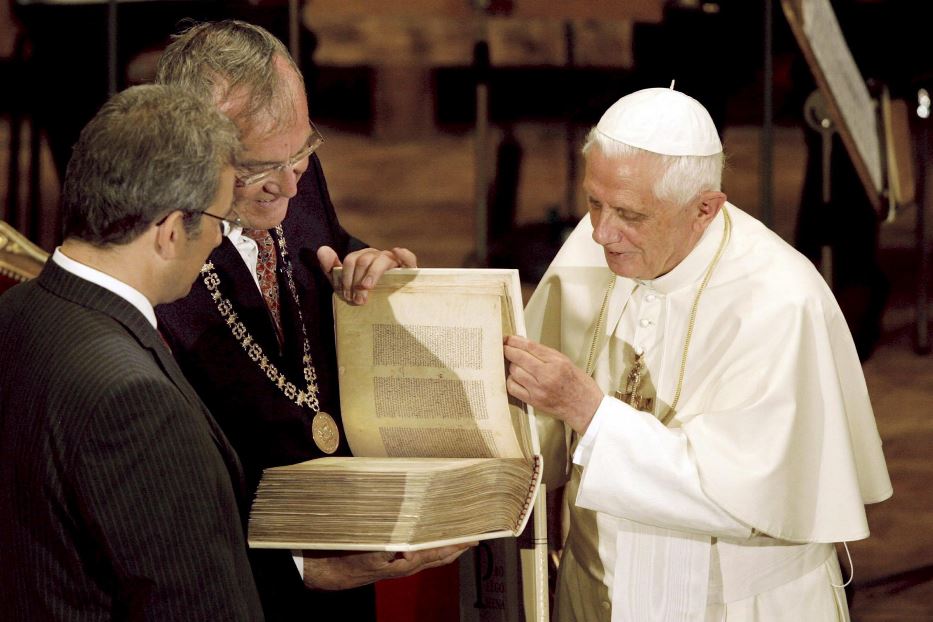
September 12, 2006, Pope Benedict during a visit to the University of Regensburg, where he delivered a famous speech to the world of science, during his visit to Bavaria – Ansa Eba / Matthias Schrader
With the death of Benedict XVI, thoughts and memories emerge from the coffin of memory, recalling the long dialogue (at a distance and sometimes in person), which began before 1980, and which I had with Cardinal Joseph Ratzinger. On a theological and rational level, Benedict was a great master of writing and speech, and his teaching in the transmission of the faith will never fade. Today I feel the responsibility to condense in a short period of time a monumental discourse on the theological and intellectual legacy of the Pope Emeritus: what a legacy for the future Church!
One of Ratzinger’s greatest tasks was to continually put faith and reason into dialogue so that they would get to know each other and be able to undertake at least part of a joint journey. It is the perspective of the post vids and ratio, published by John Paul II (1998) and prepared by a committee chaired by Ratzinger himself. over there vids and ratio It appears today, after some initial interest, as a forgotten document. Restricting the human mind to the limits of scientism and liberalism and the excesses of the feeble mind helped push it aside.
In this regard, the insightful diagnoses of Ratzinger in Subiaco (April 1, 2005), in which he accurately describes the culture of the Enlightenment: a universal claim and the perception of the self as complete in itself, needing no completion through other cultural factors ». As if this culture says: We have the mind, science and technology on our side, and this constitutes the maximum, and there is no need for other contributions. Ratzinger then raises the question whether “modern Enlightenment philosophies, as a whole, can be considered the last word of reason common to all human beings. These philosophies are distinguished by the fact that they are positive, and therefore anti-metaphysical, to the point that in the end God can have no place in them. It is based on a self-limitation of the positive mind, which is appropriate to the technical field, but where it is generalized, entails instead a distortion of the human being ».
over there Truth question, combining faith and reason so that both dialogue and upliftment are the hallmarks of Ratzinger’s theology, in which the one-dimensional proportion does not stifle reason’s natural impulse toward truth, where for him this domain lies, as for Paul VI and John Paul II, human truth. Announced firsthominem integration The other attached the Church’s message with a clear formula: “The truth that we owe to man is first of all a truth about man.”
In the theological and political realm, in a strong and broad awareness of the global role of the Universal Church, the problem of Europe was central to Ratzinger Benedict XVI, to which he devoted participatory and critical attention, sensing well the spiritual crisis and devastation of his own. secularization. Many of Benedict’s great speeches (Paris, London, Berlin, Regensburg, etc.) touch on these nuclei, in which the themes of human rights, duties, and freedom emerge. Are rights directed only at the freedom of choice of the isolated self and not integrated into society? Are there basic rights that are not liberty rights? Subiaco’s discourse, as well as that of the United Nations (2008), noted the unwarranted supremacy of liberty rights alone in Enlightenment cultures: “This culture of the Enlightenment is defined primarily by rights of liberty; It proceeds from freedom as a basic value that measures everything: freedom of religious choice, which includes the religious neutrality of the state; Freedom of expression of opinion, provided that one does not question this particular law.
The libertarian or libertarian concept of rights has so deeply inculcated Western culture and people, that heads of state hope that the right to abortion will be clearly written in the European Charter. If this happens, the betrayal of the 1948 Universal Declaration will be at hand: the libertarian West is putting the very fabric of this Declaration at grave risk.
The question to be asked again is not whether it is necessary to broaden or limit the sphere of liberty, a subject which remains general, but how to educate an idea of liberty more correct and richer than that which sees its only manifestation in self-determination and in the service of individual freedomWhich denies or puts pressure on social relations and recognition of the other. This leads to leaving aside the task of moral enlightenment of man and citizen.
Ratzinger raises the question whether modern human philosophies and slaves to the myth of progress have not lost a sense of human limits, which in civilizations other than Western civilizations have remained a warning againstArrogance. In the ancients there was sanctification And not pride towards God, and one was aware of his limitations. Today, the matter is different: the ruling wing of secular Western thought has deeply set aside the principle of reality and continues its path guided by the will of power. He wants to build the new man, not through the political revolution, but through the technological revolution. So we have not emerged from modern anthropocentrism, which is already extending postmodernism in a broad way and with new myths.
Who do we offend by mentioning God, even if publicly? European secularism assumes that we will offend followers of other religions. Ratzinger notes: “It is not the mention of God that offends adherents of other religions, but the attempt to build an absolute human society without God.” Benedict XVI’s theological and political lesson on the presence of Christians in secular society points to the need for creative or prophetic minorities. His gaze is directed not only to Christians, but also to believers in Judaism. It is expressed in a secret call to Judaism, to its creative minorities, to cooperate so that the divine light does not disappear from world history and the world does not enter into the darkness of meaninglessness. His address to the Synagogue of Rome during his visit on January 17, 2010 is important in this nucleus. As Moses teaches in the Seema and Jesus reaffirms in the Gospels, the commandments are all summed up in God’s love and mercy. This rule obliges Jews and Christians, in our time, to exercise special generosity towards the poor, women, children, foreigners, the sick, the weak and the needy… With the exercise of justice and mercy, Jews and Christians are called to proclaim and testify to the coming Kingdom of the Most High, for which we pray and work every day in hope ». The Pope found himself in harmony with the great London rabbi Jonathan Sachs, who, posing the problem of the family in dissolution, forcefully remarked that Europeans are too selfish to have children, and that this selfishness is killing secular Europe. The disintegration of the family under the banner of libertarianism and the manipulative use of technology remains an open epidemic.
In a spiritual testament dated August 29, 2006, known as the death of the Pope Emeritus, Benedict addressed the people of God, urging them to remain steadfast in the faith, and not to confuse them with discourses coming from the natural sciences and the sciences of history. which seem contradictory to faith but which they themselves then abandon, leaving alive the claim to rationality of faith. Benedict called on us not to lose the horizon according to which Christ is the way, the truth and the life, and he noted with a beautiful phrase of Tertullian: “Christ did not say that it is a habit, but the truth.”

“Infuriatingly humble alcohol fanatic. Unapologetic beer practitioner. Analyst.”


